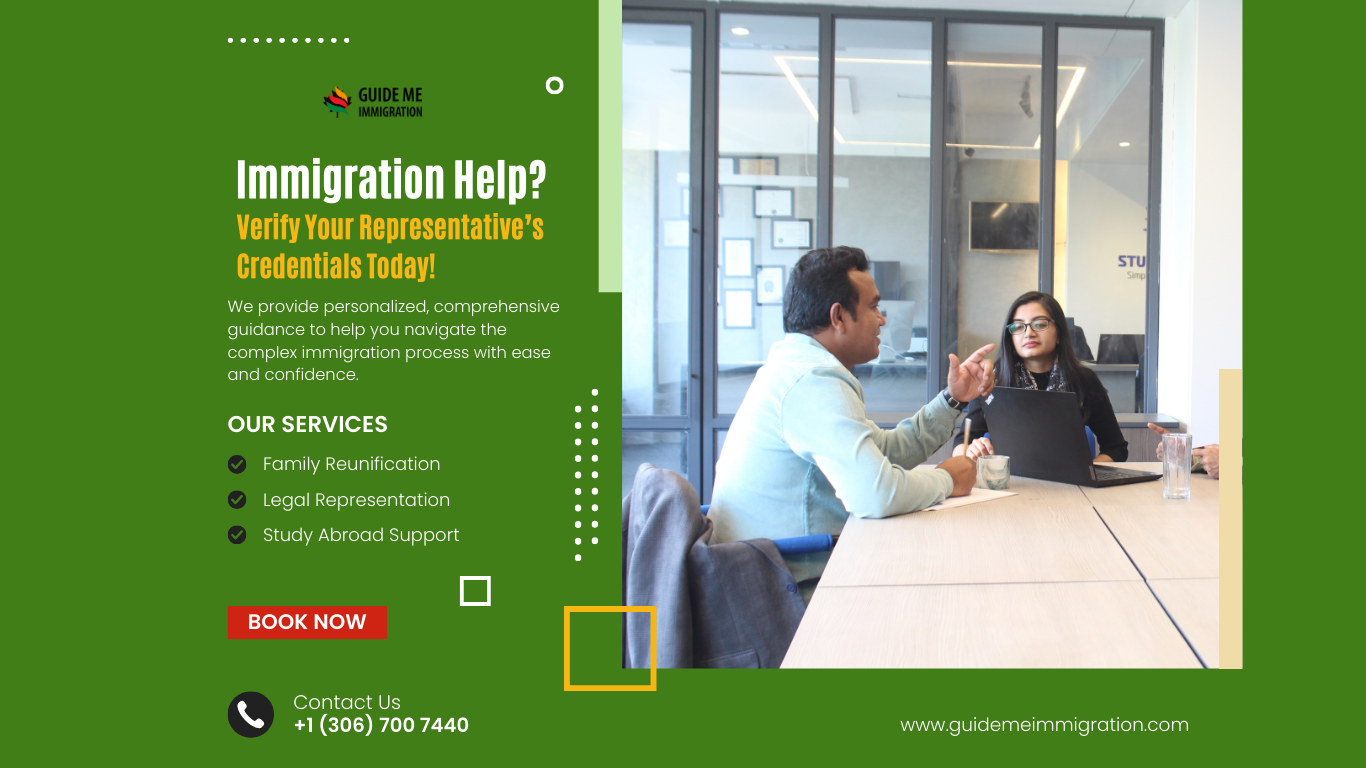How to Check If Your Immigration Representative is Authorized
Choosing the right immigration representative is a critical part of navigating the complex and often confusing process of immigration. Whether you are applying for a visa, permanent residency, or citizenship, the assistance of a qualified and authorized representative can greatly ease the process and increase your chances of success. Unfortunately, the immigration field is also rife with scams and unqualified individuals who promise quick and easy results. This makes it essential to ensure that the professional you hire is properly authorized to represent you.
In this comprehensive guide, we will walk you through the essential steps to verify whether your immigration representative is authorized. By following these steps, you can avoid potential pitfalls, protect your interests, and ensure that your immigration process runs smoothly.
Why It’s Important to Choose an Authorized Immigration Representative
Before diving into the steps for verifying authorization, it’s essential to understand why choosing an authorized immigration representative is so important.
1. Protection from Scams
Immigration fraud is a common issue. Unqualified individuals may take advantage of unsuspecting applicants by offering fraudulent services, often charging high fees and failing to deliver results. An authorized representative will not only have the required knowledge and experience but also be accountable for their actions.
2. Peace of Mind
Working with an authorized representative provides you with peace of mind knowing that the person representing your case adheres to ethical standards and is governed by a professional code of conduct.
3. Maximized Chances of Success
Immigration processes are complex and can involve legalities that require expert knowledge. An authorized representative will understand the requirements and deadlines involved and ensure that your application is as strong as possible.
4. Legal Protection
If an authorized representative makes a mistake or fails to fulfill their obligations, you can file a complaint with a regulatory body. On the other hand, unregistered agents have no such accountability.
Step 1: Verify Their Credentials
The first and most important step is to verify the credentials of the person who claims to be your immigration representative. In Canada, there are three categories of authorized representatives:
1. Licensed Lawyers
A lawyer in good standing with a provincial or territorial law society is an authorized representative. These lawyers are trained professionals who have passed bar exams and are licensed to practice law in a specific jurisdiction.
Verification: To verify a lawyer’s status, you can contact the provincial or territorial law society where the lawyer is licensed. Most law societies have online directories where you can search for the lawyer’s name and registration number.
2. Notaries in Quebec
In Quebec, notaries are authorized to represent individuals in immigration matters. Notaries must be members of the Chambre des notaires du Québec (the official governing body for notaries in Quebec).
Verification: You can verify the credentials of a Quebec notary by checking the Chambre des notaires du Québec’s official registry or website.
3. Licensed Immigration Consultants
Immigration consultants in Canada are regulated by the College of Immigration and Citizenship Consultants (CICC). Consultants who are members of the CICC are licensed to offer immigration services.
Verification: The CICC offers an online database where you can search for licensed immigration consultants by their name or registration number. This ensures that your consultant is properly authorized to assist with your immigration case.
Why Credentials Matter
Each of these professionals is subject to different regulatory bodies, but they all follow stringent professional standards. By ensuring that your representative belongs to one of these categories, you are verifying that they have the necessary qualifications and legal obligations to act on your behalf.
Step 2: Check the Official Registry
Once you have identified your representative’s profession (lawyer, notary, or consultant), you can proceed to check the official registry for that profession. These registries are maintained by the regulatory bodies mentioned above and serve as official sources for confirming the professional status of individuals.
For Lawyers
Each provincial or territorial law society in Canada maintains a directory of its members. This directory allows you to verify the professional status of lawyers within that jurisdiction. You can usually search by name or membership number.
Examples:
- Law Society of Ontario (LSO)
- British Columbia Law Society (BC Law Society)
- Law Society of Alberta (LSA)
For Notaries in Quebec
The Chambre des notaires du Québec maintains a list of all notaries in Quebec. You can check the status of a notary using their online verification tools. A valid notary must be a member of this organization to practice.
For Immigration Consultants
The College of Immigration and Citizenship Consultants (CICC) has an online registry of all authorized immigration consultants. You can search the registry using the consultant’s name or registration number to verify that they are licensed and in good standing.
CICC Website: You can visit the CICC website at www.college-ic.ca to access the registry and verify your consultant’s status.
Importance of Using Official Databases
These official databases provide reliable, up-to-date information about your representative’s status. Avoid relying on unofficial websites or social media profiles, as they may provide misleading or inaccurate details.
Step 3: Ask for Proof of Authorization
If you are unsure or still have doubts about a representative’s credentials, you have the right to ask for proof of their authorization. A legitimate immigration professional will be more than happy to provide this information.
What You Can Ask For:
- A Copy of Their Registration Certificate: This document proves their membership with the relevant regulatory body (e.g., CICC, provincial law society).
- Their Registration Number: The representative should be able to provide a registration number, which can be used to check their status in the official registry.
- Proof of Good Standing: In some cases, you may want confirmation that the individual is in good standing with their regulatory body and has no history of disciplinary actions.
Why This Step Is Important
If a representative refuses to provide proof of authorization or is hesitant to share their registration details, this is a red flag. Transparency is a hallmark of professional conduct, and legitimate representatives will have no problem providing this information to ensure trust.
Step 4: Avoid Unregistered Agents
Unregistered agents or unauthorized representatives are a major source of concern in immigration services. These individuals are not regulated by any professional body, which means they can operate without any oversight or accountability.
Red Flags to Watch Out For:
- Guaranteeing Results: If someone promises a guaranteed outcome (e.g., guaranteed approval of your visa), this is a strong indication that they may not be legitimate. Immigration decisions are made by government authorities, and no representative can guarantee success.
- Demanding Cash Payments: Unauthorized representatives may ask for payments in cash or suggest alternative payment methods to avoid traceability. Always opt for payments made through official channels.
- Pressure Tactics: Unregistered agents may pressure you into making quick decisions or signing documents without fully explaining the terms and conditions.
- No Verifiable Credentials: If the representative is unable or unwilling to provide evidence of their authorization, this is a major red flag.
Consequences of Working with Unregistered Agents:
Working with an unregistered agent can put your immigration process at risk. In addition to facing potential delays or refusals, you may also become a victim of fraud, lose your money, or face legal issues. If you suspect that an agent is unregistered, it’s crucial to cease working with them immediately.
Additional Resources for Applicants
To help you navigate this process, here is a list of official resources:
- CICC Authorized Consultants Registry: www.college-ic.ca
- Law Society of Ontario (LSO): www.lso.ca
- British Columbia Law Society: www.lawsociety.bc.ca
- Chambre des notaires du Québec: www.cnq.org
Case Studies and Real-Life Examples
Example 1: The Risk of Unregistered Agents
A family in India paid thousands of dollars to an unauthorized agent who promised guaranteed permanent residency in Canada. After several months, they realized their application was never submitted, and the agent had disappeared. They were left with financial loss and emotional distress.
Example 2: The Benefit of Authorized Representatives
A student in Bangladesh consulted a licensed immigration consultant at Guide Me Immigration. The consultant provided detailed guidance, ensured all documents were properly filed, and maintained transparency throughout the process. The student successfully obtained a study permit within the expected timeline.
Conclusion
Choosing an authorized immigration representative is essential for a smooth and successful immigration journey. By verifying their credentials, checking official registries, asking for proof of authorization, and avoiding unregistered agents, you can protect yourself from scams and ensure that you are receiving the best possible service. Always prioritize working with licensed professionals who are accountable to regulatory bodies, and don’t hesitate to ask for transparency and proofs






